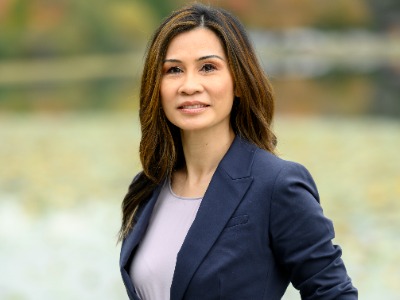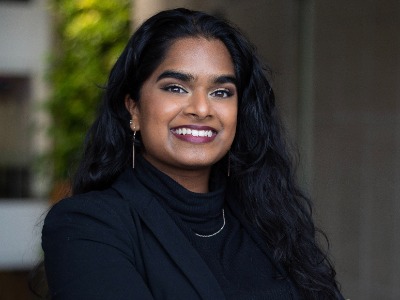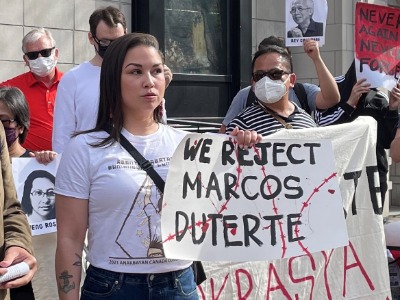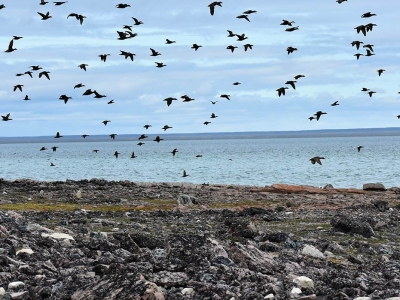By Alysha A. Cunningham
From leaders who are combating racism to those promoting Asian culture, Carleton students are making a positive impact in their communities — throughout Asian Heritage Month and beyond.
Continue reading to learn more about a few of our inspiring Asian student leaders.
Doris Mah is Combating Anti-Asian Racism Across Canada
When anti-Asian hate crimes in the Vancouver area rose by over 700 per cent over the past year, Master of Political Management student, Doris Mah decided she needed to act.
While balancing motherhood, studies and work in an MP’s office, Mah co-founded the Stand With Asians Coalition (SWAC) with the goal of uniting grassroots activists across Canada in the fight against anti-Asian hate and all forms of racism. The movement dedicates May 10 as the National Day of Action Against Anti-Asian Racism.

Master of Political Management student Doris Mah
“A lot of people ask why one day and not every day of the year,” says Mah. “It’s one day we set aside to raise the awareness of the need to combat racism, not just against Asians, but racism in all forms.”
Mah’s call to action quickly spread across the nation and her anti-racism efforts led the Stand with Asians Coalition to win the 2022 B.C. Multiculturalism & Anti-Racism Award and Mah herself was honoured with the United Global Chinese Women’s Association of Canada’s Community Special Contribution Award. But sadly, her work also inspired online trolls to flood her inboxes with hate mail.
“The racism Asians endure hasn’t stopped, in fact it has elevated since the pandemic,” says Mah. “We have to take proactive measures to combat and fight against all forms of hate and racism.”
Mah, who immigrated from Hong Kong when she was 18, is also one of the top 75 finalists nominated for this year’s 14th Annual Top 25 Canadian Immigrant Award.
“I think it’s important to recognize not just the contributions that Asian Canadians have provided the nation, but to also recognize the hardships they faced to reach this.”
Cindy Tran Celebrates Asian Culture Through Storytelling
Vietnamese Canadian and Master of Journalism candidate Cindy Tran’s career was influenced by a defining moment in 2020 when her grandmother was the target of anti-Asian attack at her home in the Ottawa Valley. The attack was the tipping point of years of racism and microaggressions the Tran family experienced since finding refuge in Canada after the Vietnam War.

Master of Journalism candidate Cindy Tran
“When I started university, I wasn’t sure what type of journalism I wanted to pursue but that attack put things in perspective for me,” says Tran. “I wrote about what my family had endured as one of maybe five Asian families in all of Pembroke, and I didn’t expect it to get the attention that I did.”
Tran wrote about the experience through her personal blog which was picked up and published by the Ottawa Citizen. The article prompted the City of Pembroke to create an official diversity committee and led Tran to her role as a journalist and associate producer with CBC, where she focuses on stories that highlight Asian people and their cultures.
Some of Tran’s recent pieces include stories on Korean women’s curling and Lunar New Year celebrations, to connecting with distant family through Asian foods.
“These are the stories I want to hear and need to hear as an Asian Canadian, but also that others need to hear too,” says Tran. “I want to tell stories that aren’t just about conflicts but instead celebrate our cultures and share what people should know about us but don’t.”
Dilki Jagoda Addresses Public Policy as the Root of Asian Discrimination
In early 2020, Bachelor of Public Affairs and Public Policy student Dilki Jagoda saw a false narrative making its rounds and felt determined to correct it.

Bachelor of Public Affairs and Public Policy student Dilki Jagoda
“When anti-Asian discrimination and hate crimes were at their peak, I felt that there was a narrative making it seem as if this came out of nowhere,” says Jagoda. “I wanted to highlight that this narrative, and the processes that make it thrive, have been around for our entire history as a country.”
Specializing in rights and human development, Jagoda’s research focuses on how anti-Asian racism and discrimination in Canada has historically flourished through public policy framed by the government.
Jagoda says that part of the solution is for governments to fortify funds within their budgets for combating anti-Asian racism, as Canada’s current anti-racism policy structure does not include it.
“We might not view it as necessary but putting something like that in writing and releasing it to the public can really change a lot because it’s acknowledging something as an issue and acknowledging how serious it truly is,” says Jagoda.
Jagoda hopes to help bring this goal to realization while providing an intersectional approach to public policy making when she completes her studies. Already taking steps in this direction, Jagoda assisted with integrating anti-racist pedagogy into public policy through Carleton’s Students as Partners Program.
“I would love to be a part of developing policy that will eventually get us to a place where we can remove these subconscious biases in our society and in our institutions, because there are a lot of barriers that aren’t acknowledged.”
Alyssa Schenk is Shining Light on Canadian Filipino Youth Experience
As a social worker with a focus in immigration and refugees, Alyssa Schenk witnessed many young newcomers to Canada struggle with the lack of visible representation as they try to find their place in their new home. This challenge is what drove Schenk to pursue her PhD in Social Work.

PhD candidate Alyssa Schenk at the Ottawa protest against corruption in the Philippine national election.
“It’s quite a big project to just broadly cover immigrants and refugee children, so I had to make the decision to narrow it down to an experience that I too have gone through being Filipino,” says Schenk.
Schenk’s research focuses on the Filipino youth experience with cultural identity and how they choose to navigate and essentially perform their own curated culture.
Growing up, Schenk admits that she didn’t see reflections of herself in any of her role models, educators or even pop culture — a common experience for the diaspora.
“Without being able to see reflections of themselves in leadership or educators, it’s a struggle for a lot of Filipino youth to understand who they were and who they are going to be as they try to maintain some resemblance of their cultural heritage while stepping into the role as a new Canadian.”
Schenk is personally addressing this by taking on leadership positions within the Canadian Filipino community. She is currently on the executive committee of Anakbayan Canada, a national democratic youth organization that aims to educate and mobilize Filipino youth, and serves as the chairperson of its local Ottawa chapter. She is also a founding member of Filipinos in Canada-Academics, Researchers and Scholars (FiCARS).
A dedicated mentor, Schenk is a former advisor and mentor for the Filipino Youth Fellowship and mentor for Pinoys on Parliament.
“The youth have been the most influential to me as an individual, scholar and activist,” says Schenk. “It’s exciting to witness all age groups of Filipinos and Asians hold on to bits of their traditions and transform them in new and interesting ways to preserve our own cultures.”
Tuesday, May 17, 2022 in Asian Heritage Month, Faculty of Graduate and Postdoctoral Affairs, Faculty of Public and Global Affairs, Journalism and Communication, Political Management, Social Work
Share: Twitter, Facebook



